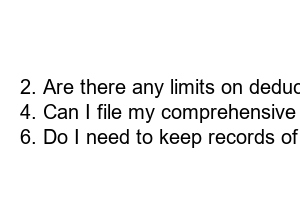종합소득세 대상자
Subject to Comprehensive Income Tax: Understanding the Basics
Understanding income tax can be quite overwhelming, especially when it comes to comprehensive income tax. It’s one of the many taxes individuals and businesses are required to pay, and it’s important to have a clear understanding of how it works. In this blog post, we’ll break down the basics of comprehensive income tax and address some commonly asked questions.
1. What is comprehensive income tax?
Comprehensive income tax is a tax imposed on individuals and businesses based on their total income. This includes not only wages and salaries but also income from investments, rental properties, self-employment, and other sources. In simple terms, it is the *total* income you earn that is subject to taxation.
2. How is comprehensive income tax calculated?
Calculating comprehensive income tax can be complex, as it involves various tax brackets and deductions. Generally, it entails determining your taxable income by subtracting deductions and allowances from your total income. The resulting amount is then subject to tax based on the applicable tax rates.
3. Are there any exemptions or deductions?
Yes, there are several exemptions and deductions that can help reduce your comprehensive income tax liability. These include personal deductions, such as those for medical expenses or mortgage interest, as well as business-related deductions like depreciation of assets. Understanding and utilizing these exemptions and deductions can significantly lower your tax burden.
4. How is comprehensive income tax different from other taxes?
Comprehensive income tax is distinct from other taxes, such as sales tax or property tax. While those taxes are specific to certain transactions or assets, comprehensive income tax is based on your overall income. It takes into account a wide range of sources and activities, providing a more comprehensive view of your financial situation.
5. Can comprehensive income tax be reduced?
Yes, there are legal ways to reduce your comprehensive income tax. By employing tax planning strategies, individuals and businesses can leverage exemptions, deductions, and credits to minimize their tax liability. Consulting with a tax professional or accountant can help identify opportunities to optimize your tax planning.
6. How does comprehensive income tax impact the economy?
Comprehensive income tax is one of the primary sources of government revenue and plays a vital role in funding public services and infrastructure. It’s the tax that enables governments to provide healthcare, education, defense, and other essential services to its citizens. However, high tax rates may discourage investment and hinder economic growth, making it crucial to strike a balance.
In summary, comprehensive income tax is a tax imposed on individuals and businesses based on their total income. It encompasses various sources of income, and calculating it involves determining taxable income and applying applicable tax rates. Utilizing exemptions and deductions can help reduce tax liability, and comprehensive income tax contributes to government revenue and public services. Understanding its basics can empower individuals and businesses to make informed financial decisions.
Frequently Asked Questions:
1. How is comprehensive income tax different from regular income tax?
2. Are there any limits on deductions for comprehensive income tax?
3. What happens if I fail to pay comprehensive income tax?
4. Can I file my comprehensive income tax return online?
5. Are there any penalties for underpayment of comprehensive income tax?
6. Do I need to keep records of my comprehensive income for tax purposes?

